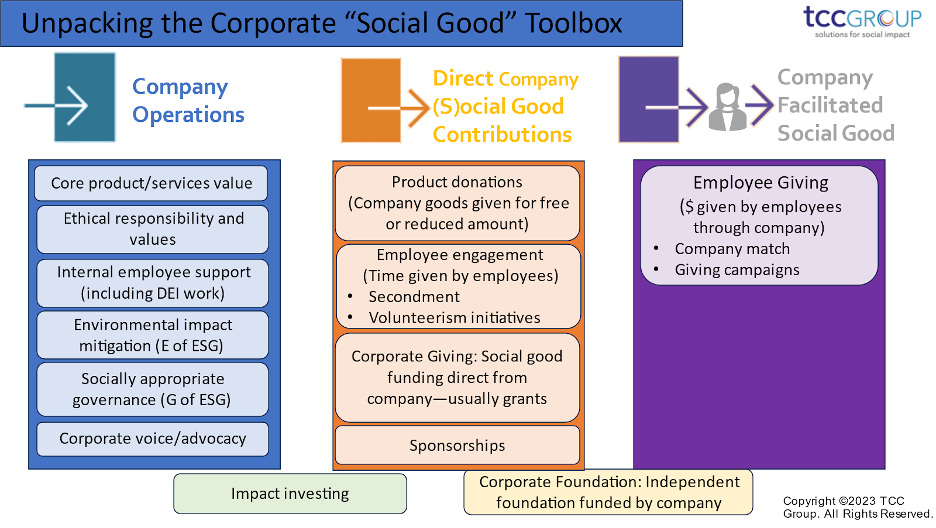Hi AEA! Morgan Buras-Finlay (Raya Cooper Impact Consulting), Veronica Olazabal (BHP Foundation), Jared Raynor (TCC Group), and John Sherman (Sherman Impact Consulting) here to discuss evaluation, corporations and sustainability.
Interesting…tell us more.
Evaluators have been discussing issues of global sustainability and the role of evaluation for some time (see: Blue Marble Evaluation and “Transformation to Global Sustainability: Implications for Evaluation and Evaluators.”). However, with the increasing number of corporations and private-market entities seeking to have a positive impact on people and planet (not just their profits), opportunities are emerging for evaluators to contribute. The size of the investments offers witness – in 2021, investments in private companies with intended social impacts broke $1T, and investments in publicly traded companies identified as environmentally and socially responsible exceeded $35T. Importantly for evaluators, to protect investors from fraudulent claims, governments are beginning to require standardized reporting on these impacts as well as how companies will manage negative impacts. The European Union has the most far-reaching requirements (here), the U.S. is finalizing its requirements primarily on climate issues, and California just adopted climate impact reporting and management policies.
Hot Tips
#1: How do corporations engage for social good?
Evaluators are often good at articulating how corporations contribute to negative social and environmental impact (exploitation, pollution, and nefarious political influence). We are less skilled at recognizing the myriad ways that corporations can contribute to social good. These include core operational work such as providing fair wages, supplying products that make peoples’ lives better, and mitigating (if not directly addressing) environmental impact. Companies also donate resources for social good, facilitate employee giving to nonprofits, and invest in companies that will deliver positive social goods and services (impact investing).

Having worked within these constructs, we’ve learned a few things about corporations. First, they are not filled with bad people plotting the end of the world. In fact, there are leading examples of corporations realizing their part in driving sustainable and equitable choices. Second, they need us. The World Benchmarking Alliance is keeping track of corporate behaviors and how they rank. In their latest report, they explain that despite the urgency of our times, we have a corporate accountability gap and one pathway to closing that gap is better standards, better data, and better assessment—the stuff of evaluators! And third, our skills and competencies are directly transferable.
#2: What skills and tools, you ask?
Surprisingly, many of the tools we have gained in our evaluation training are useful in the corporate context. For instance, theory of change and evaluative thinking are directly applicable in the corporate setting. Evaluators are already skilled translators (though we should enhance corporate language fluency), an important skill for navigating complex and diverse value systems. The rise of ESG (Environment, Social and Governance) regulations is making conversations about direct and indirect impact more common, and evaluators can leverage the concepts of scope 1, scope 2 and scope 3. A major differentiator with the public sector is the speed at which large corporations move–evaluators must be skilled at balancing rigor and rapid iteration to help companies make the connection between impact and their business models.
What is surprising? As evaluators working with corporations, it has been interesting to learn about other teams already working in ‘accountability adjacent’ spaces, such as accountants, legal, financial and risk managers, and those engaged in research (e.g. user experience or business analytics). Many understand the purpose of evaluators and are supportive of integrating evaluative thinking into their work.
For more on this topic, join AEA’s Social Impact Measurement TIG!
The American Evaluation Association is hosting Social Impact Measurement TIG Week with our colleagues in the Social Impact Measurement Topical Interest Group. The contributions all this week to AEA365 come from our SIM TIG members. Do you have questions, concerns, kudos, or content to extend this AEA365 contribution? Please add them in the comments section for this post on the AEA365 webpage so that we may enrich our community of practice. Would you like to submit an AEA365 Tip? Please send a note of interest to AEA365@eval.org. AEA365 is sponsored by the American Evaluation Association and provides a Tip-a-Day by and for evaluators. The views and opinions expressed on the AEA365 blog are solely those of the original authors and other contributors. These views and opinions do not necessarily represent those of the American Evaluation Association, and/or any/all contributors to this site.
